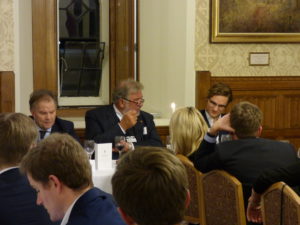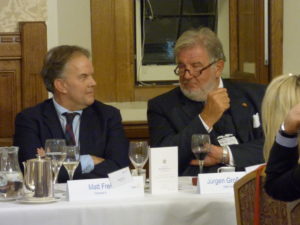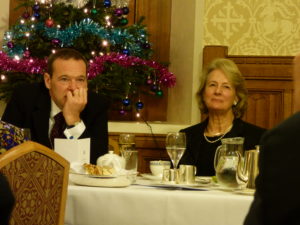
Too much anger and little good news: 2016 will go down as a bad year for Europe and the world. At a meeting of United Europe’s members and alumni in London in early December, pessimism shaded the debate. Both the Brexit vote and Donald Trump’s election victory in the United States are casting long shadows over the coming years as well.
“I have been involved in politics for a very long time, and this has been the worst year that I have ever experienced,” said Baroness Jay of Paddington, board member of United Europe, who hosted the gathering at the House of Lords. Jürgen Grossmann, founder of United Europe, agreed. “You need a looking glass if you are looking for good news,” he said, referring to the recent presidential election in Austria where voters opted against a populist, Eurosceptic candidate.
The topic of the evening was “Continent Cut Off – What follows from the Brexit vote.” Around 40 people had come to take part in the discussion with Baroness Jay, Jürgen Grossmann and Matt Frei, anchor man at Britain’s Channel Four who was moderating the debate.
From Europe to the United States
There was little doubt amid this group that the British decision to leave the European Union is causing enormous political and economic damage to Britain itself as well as the rest of Europe. Yet this does not seem to deter voters elsewhere.

The anti-globalisation and anti-liberal movement continues to grow in Europe and beyond, even if every country has its own particular issues. “To quote Tolstoy: All families are unhappy in their own ways,” said Matt Frei. “It seems that this is true for countries, too. The unhappiness of Britain is quite different from that of Italy.”
From Europe, the discussion moved across to the United States where the populist movement recently scored a spectacular victory. With her insight into several decades of political life in the United States, Margaret Jay gave some explanations for Donald Trump’s election success. “People’s incomes have been static for a long time,” she said “In the post-war years, everything was always getting better. Now, the American dream no longer holds true.”
Taking peace for granted
Then there was the role of the media. Twitter with its 140 characters makes it difficult to describe the complexity of the world. Local newspapers and partisan media like Fox News do not provide their readers and viewers with a larger perspective. “People are insecure,” Margaret Jay said. “They have been persuaded that this is happening because a terrible government has sold their jobs overseas.”

Another factor – and one that holds true for Europe, too – is the fall-out from the financial crisis. Many of the managers responsible for the financial meltdown starting in 2007 have not been sanctioned in any way. Worse, in some cases they continue to run the show. At the same time, income inequality is rising in many countries.
Yet is this enough to explain the populist anger? It was Jürgen Grossmann who pointed out that in fact, the average industrial worker in a Western country today is much better off than he could ever have dreamt of in the post-war era. Social achievenments like paid vacations or air travel are taken for granted.
“For a certain number of years, we have taken everything for granted, internally and externally,” Jürgen Grossmann said. “But we shouldn’t forget that the EU has brought us peace. Even in recent years, it has provided a platform that made the reconciliation between Germany and Poland possible. Today, we see an almost devilish readiness of people to risk all of that.”
Fire in the belly
In Britain, Margaret Jay added, there isn’t even much awareness of the role of the European Union in keeping the peace for 70 years. “This is something that the Remain campaign never talked about. It is extraordinary that there was no sense that this peace is something worth speaking about.”
2016 was a terrible year, and 2017 may not necessarily be better, Matt Frei warned when wrapping up a lively and quick-paced discussion. The coming year brings elections in France, Germany and the Netherlands – three core countries of Europe which have seen a sharp rise in anti-European populism over the past years.
“We are very smart about analysing the situation,” concluded Jürgen Grossmann. “But what we now need is some fire in the belly to fight for what we believe in.”


